情态动词should
should的用法总结
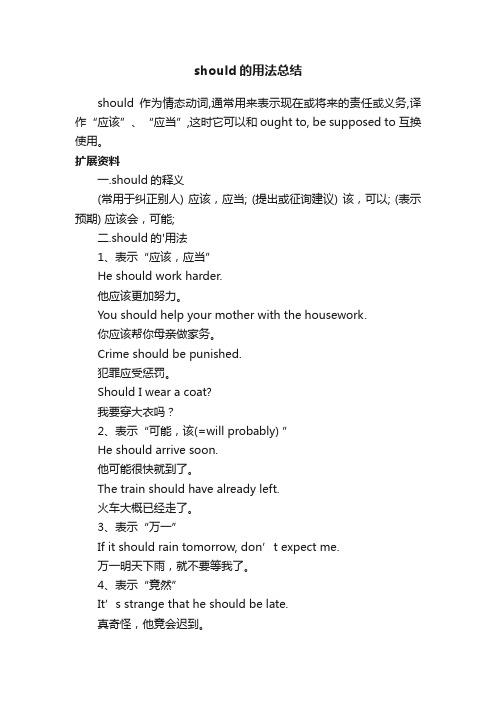
should的用法总结should作为情态动词,通常用来表示现在或将来的责任或义务,译作“应该”、“应当”,这时它可以和ought to, be supposed to 互换使用。
扩展资料一.should的释义(常用于纠正别人) 应该,应当; (提出或征询建议) 该,可以; (表示预期) 应该会,可能;二.should的'用法1、表示“应该,应当”He should work harder.他应该更加努力。
You should help your mother with the housework.你应该帮你母亲做家务。
Crime should be punished.犯罪应受惩罚。
Should I wear a coat?我要穿大衣吗?2、表示“可能,该(=will probably) ”He should arrive soon.他可能很快就到了。
The train should have already left.火车大概已经走了。
3、表示“万一”If it should rain tomorrow, don’t expect me.万一明天下雨,就不要等我了。
4、表示“竟然”It’s strange that he should be late.真奇怪,他竟会迟到。
5、表示粗暴地拒绝一项建议、要求或指示What time does the film start?电影什么时候开始?How should I know?我怎么知道?Ann’s very unhappy.安非常不高兴。
Could your wife help us in the office tomorrow?你妻子明天能到办公室来帮帮我们吗?6、should加完成式:should have done表示“本应该做某事,但事实上却没有做”;shouldn’t have done表示“本不该做某事,但事实上却做了”。
如:You should have got up earlier. 你本应该早点起的。
should用法总结汇总

千里之行,始于足下。
should用法总结汇总Should是一个情态动词,用于表示建议、意愿、命令、推想等。
它有多种用法和结构,下面将对should的用法进行总结。
1. 表示建议:a. 主语+should+动词原形:用于表示一般性的建议或意愿。
- You should exercise regularly to stay healthy.(你应当经常熬炼以保持健康。
)- We should leave early to avoid traffic.(我们应当提前离开,以避开交通拥堵。
)b. 主语+would/should+动词原形:用于表示有礼貌或客气的建议。
- Would you should drop me off at the station?(你可以把我送到车站吗?)- Should I help you with your luggage?(我来帮你拎行李吗?)c. It is (high) time that+主语+should+动词原形:用于表示“早该……了”。
- It is high time that we should take action to protect the environment.(我们早该实行行动爱护环境了。
)- It is time that you should start looking for a job.(你早该开头找工作了。
)2. 表示命令或要求:主语+should+动词原形:用于表示命令、要求或建议具有强制性的状况。
- You should stop talking in class.(你应当停止在课堂上讲话。
) - They should pay the bill before leaving the restaurant.(他们离开餐厅之前应当先付款。
)第1页/共2页锲而不舍,金石可镂。
3. 表示推想、假设、猜想:a. 主语+should+动词原形:用于表示对某种可能性或预期结果的猜想。
小升初英语情态动词should

小升初英语情态动词shouldShould表示"劝说"、"建议"时这时should常译作"应当"。
如:We Should learn about the computer and make full use of it.我们应该了解运算机并加以充分利用。
You should listen to the doctor's advice.你应当听大夫的话。
You should study the article care fully. 你应当细,心学习这篇文章。
should还能够表示"推测"、"可能"They should be here by now.他们现在可能到了。
The reference book should be in the reading-room.这本参考书可能在阅览室里。
should有时表示说话人的感情如惊奇、愤慨、败兴等Why should I go? 我干吗要去?(不满)I am sorry that he Should be so obstinate.我专门遗憾,他竟如此顽固。
(败兴)It's strange that it should be so hot today.专门怪,今天如何这么热。
(惊奇)should后跟动词的完成式时这时句子指的是过去的情况。
假如是确信句,常说明某件事本应完成而未完成;假如是否定句,表示发生了不应当发生的情况。
如:You should have stopped at in red light. 你见了红灯本应该停车。
You Should not have gone back to work without the doctor's pe rmission.你不应当未经大夫许可就回去工作。
He Should have come earlier. 他应早一点来。
should是情态动词吗
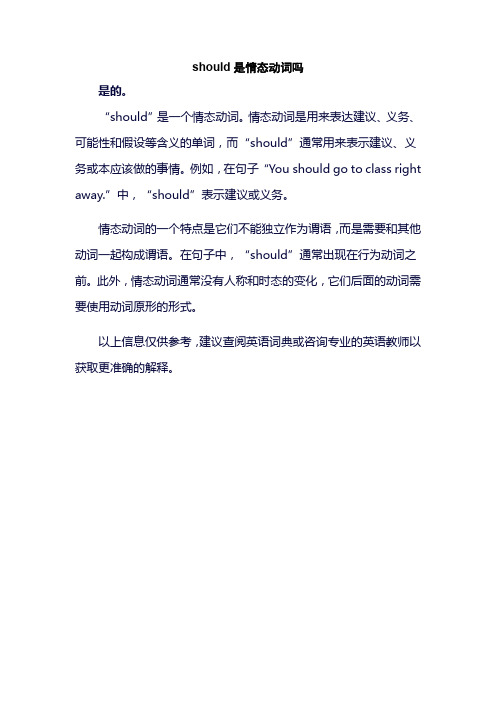
should是情态动词吗
是的。
“should”是一个情态动词。
情态动词是用来表达建议、义务、可能性和假设等含义的单词,而“should”通常用来表示建议、义务或本应该做的事情。
例如,在句子“You should go to class right away.”中,“should”表示建议或义务。
情态动词的一个特点是它们不能独立作为谓语,而是需要和其他动词一起构成谓语。
在句子中,“should”通常出现在行为动词之前。
此外,情态动词通常没有人称和时态的变化,它们后面的动词需要使用动词原形的形式。
以上信息仅供参考,建议查阅英语词典或咨询专业的英语教师以获取更准确的解释。
情态动词should
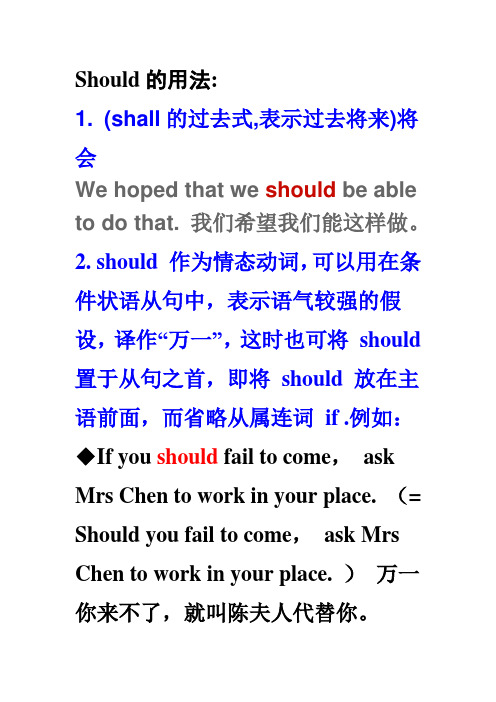
Should的用法:1.(shall的过去式,表示过去将来)将会We hoped that we should be able to do that. 我们希望我们能这样做。
2. should 作为情态动词,可以用在条件状语从句中,表示语气较强的假设,译作“万一”,这时也可将should 置于从句之首,即将should 放在主语前面,而省略从属连词if .例如:◆If you should fail to come,ask Mrs Chen to work in your place. (= Should you fail to come,ask Mrs Chen to work in your place. )万一你来不了,就叫陈夫人代替你。
◆If anyone should come,say I am not at home. (= Should anyone come,say I am not at home. )万一有人来访,就说我不在家。
◆I f it should rain tomorrow,Iwouldn't go.(= Should it rain tomorrow,I wouldn't go.)◆If the car should break downon the way, you would haveto walk back.◆Ask her to ring me up if youshould see her.万一汽车中途抛锚,你就得走回来。
3.(表示可能性、推测、推论或期待)可能;(按理)应该She should be here any minute.她该马上就到。
Dinner should be ready by now.此刻晚饭应该做好了。
4.(表示义务、责任)应该,应当You should do as she says.你应当照她说的去做。
He should work harder.他应该更加努力。
情态动词should

3.作主语或宾语的同位语,用来加强语气,可译成”亲 自,本人”,即使去掉,也不影响句子的完整性。
肯定句:主语+should+动词原形。。。。 否定句:主语+shouldn't/should not+动词原形+。。。。 一般疑问句:Should+主语+动词原形+。。。?
用法: 1.表示征求建议,常用于第一,三人称作主语的句子中。 Should I trust him? What should he do?
4.作shall的过去式,用于主语是第一人称的句子中, 表示打算或期望做的事情。
He told me that we should be leaving the next day.
反身代词
1.He hurt himself 2.Jenny cut herself. 3.I hurt myself playing soccer.
表示反射或强调的代词叫反身代词。它表明动作反射回 动作执行者本身,既动作的执行者与承受者互指。
1.作动词或介词的宾语,表明宾语和主语是同一个/些人 或事物。
Maria bought herself a scarf.
We must look after oursel是主语,通常描述身体, 精神等方面的感觉或状态。
情态动词should
1. I think you should lie down and rest. 2. You shouldn't eat so much next time. 3.Should I put some medicine on it?
关于should的语法知识点
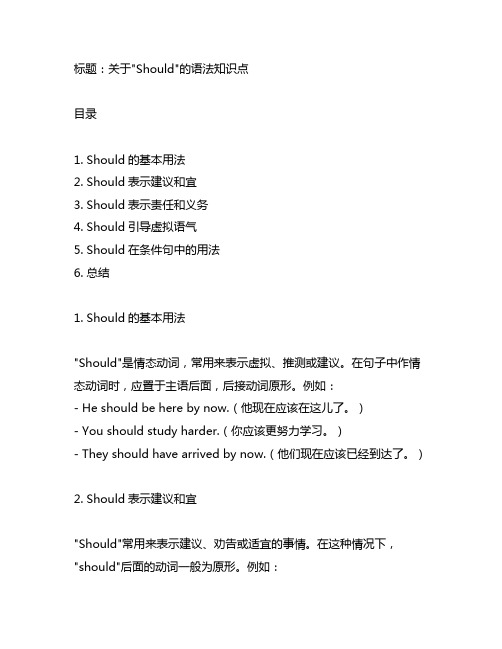
标题:关于"Should"的语法知识点目录1. Should的基本用法2. Should表示建议和宜3. Should表示责任和义务4. Should引导虚拟语气5. Should在条件句中的用法6. 总结1. Should的基本用法"Should"是情态动词,常用来表示虚拟、推测或建议。
在句子中作情态动词时,应置于主语后面,后接动词原形。
例如:- He should be here by now.(他现在应该在这儿了。
)- You should study harder.(你应该更努力学习。
)- They should have arrived by now.(他们现在应该已经到达了。
)2. Should表示建议和宜"Should"常用来表示建议、劝告或适宜的事情。
在这种情况下,"should"后面的动词一般为原形。
例如:- You should take a break.(你应该休息一下。
)- We should start early.(我们应该早点开始。
)- She should see a doctor.(她应该去看医生。
)3. Should表示责任和义务"Should"也可以表示责任和义务,通常用于表示某种道德上的义务或应尽的责任。
例如:- You should apologize for your mistake.(你应该为自己的错误道歉。
)- We should help those in need.(我们应该帮助有需要的人。
)- She should have returned the money.(她本应该把钱退还。
)4. Should引导虚拟语气在虚拟语气中,"should"常用来表示主观的推测或建议。
在这种情况下,"should"后面的动词一般为原形。
should是情态动词吗
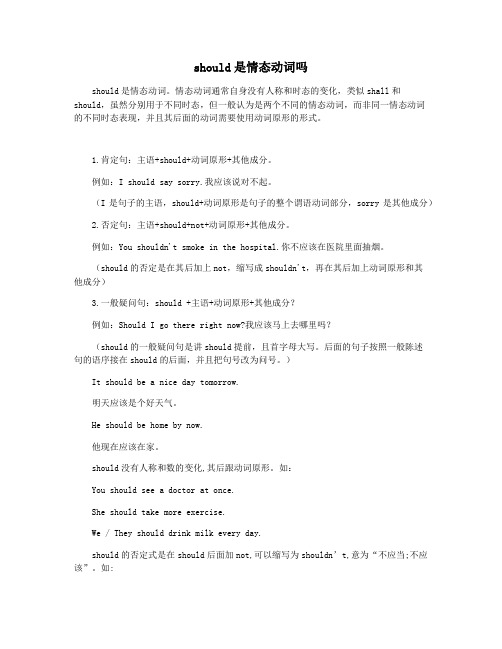
should是情态动词吗should是情态动词。
情态动词通常自身没有人称和时态的变化,类似shall和should,虽然分别用于不同时态,但一般认为是两个不同的情态动词,而非同一情态动词的不同时态表现,并且其后面的动词需要使用动词原形的形式。
1.肯定句:主语+should+动词原形+其他成分。
例如:I should say sorry.我应该说对不起。
(I是句子的主语,should+动词原形是句子的整个谓语动词部分,sorry是其他成分) 2.否定句:主语+should+not+动词原形+其他成分。
例如:You shouldn't smoke in the hospital.你不应该在医院里面抽烟。
(should的否定是在其后加上not,缩写成shouldn't,再在其后加上动词原形和其他成分)3.一般疑问句:should +主语+动词原形+其他成分?例如:Should I go there right now?我应该马上去哪里吗?(should的一般疑问句是讲should提前,且首字母大写。
后面的句子按照一般陈述句的语序接在should的后面,并且把句号改为问号。
)It should be a nice day tomorrow.明天应该是个好天气。
He should be home by now.他现在应该在家。
should没有人称和数的变化,其后跟动词原形。
如:You should see a doctor at once.She should take more exercise.We / They should drink milk every day.should的否定式是在should后面加not,可以缩写为shouldn’t,意为“不应当;不应该”。
如:You should not / shouldn’t work on the computer all day.感谢您的阅读,祝您生活愉快。
情态动词should的用法
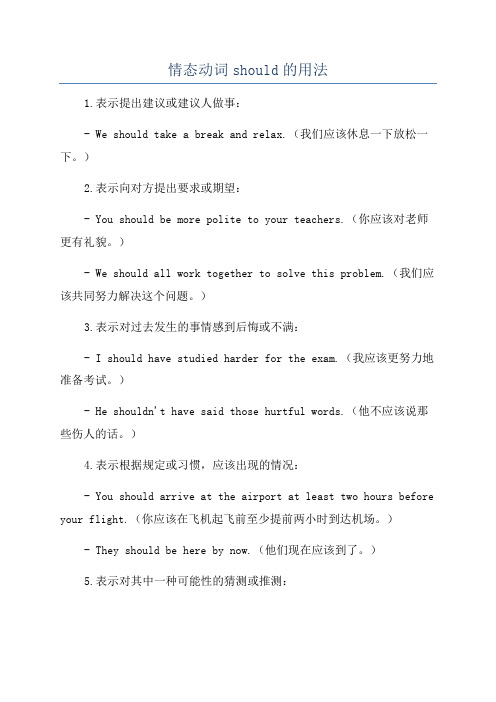
情态动词should的用法1.表示提出建议或建议人做事:- We should take a break and relax.(我们应该休息一下放松一下。
)2.表示向对方提出要求或期望:- You should be more polite to your teachers.(你应该对老师更有礼貌。
)- We should all work together to solve this problem.(我们应该共同努力解决这个问题。
)3.表示对过去发生的事情感到后悔或不满:- I should have studied harder for the exam.(我应该更努力地准备考试。
)- He shouldn't have said those hurtful words.(他不应该说那些伤人的话。
)4.表示根据规定或习惯,应该出现的情况:- You should arrive at the airport at least two hours before your flight.(你应该在飞机起飞前至少提前两小时到达机场。
)- They should be here by now.(他们现在应该到了。
)5.表示对其中一种可能性的猜测或推测:- Someone should be waiting for you at the hotel.(有人应该在酒店等你。
)- It should be sunny tomorrow.(明天应该是晴天。
)注意事项:- Should常与情态动词have连用,形成完成时态,表示对过去未实现的事情的惋惜或责备。
- Should的否定形式为should not或shouldn't,常缩写为shouldn't。
人教版初中英语八年级上册【看漫画学语法】情态动词should的用法

易错点3
should have done的用法
should与现在完成时相结合构成“should have done” 结构:表示对过去事情的虚拟推测,意为“应该做 过某事”(而事实上并没有做)。
I should have finished my homework by the end of last week. 上周末,我本应该写完作业的。
否定句:should后加not(缩写为shouldn’t)
You should not (shouldn’t) run faster.
一般疑问句:should提前
Should I run faster?
看漫画找规律
请找出漫画中所有情态动 词。这些情态动词分别表 达什么含义呢?
Will you show me how to play the piano, Uncle Jack? OK, come and sit here and I’ll tell you what to do.
— It was great fun. You____ have come.
A. must
B. can
C. should
D. may
1. 表示建议时,意为“应当”。
例:You should see a dentist. 你应当去看牙医。
should
2. 表示义务或责任时,意为“应该”。
例:We should respect the old. 我们应该尊重老人。
3. 表示要求与命令时,意为“应该”。
例:You should listen to the teacher carefully in class. 在课堂上,你应该认真听老师讲课。
(完整版)情态动词should的讲解
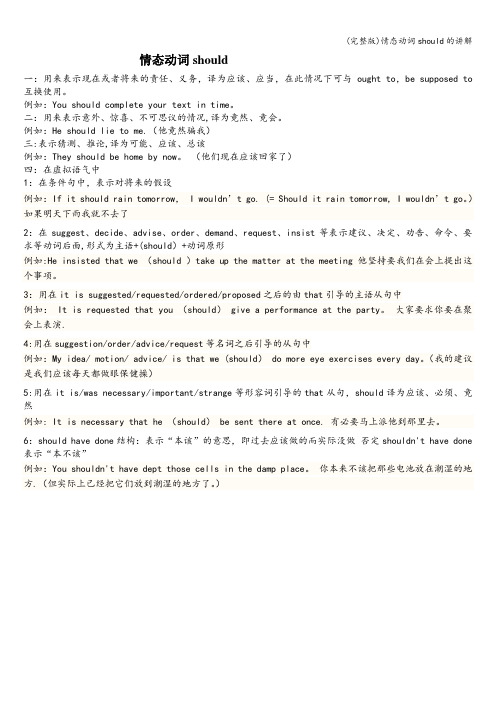
(完整版)情态动词should的讲解情态动词should一:用来表示现在或者将来的责任、义务,译为应该、应当,在此情况下可与ought to,be supposed to 互换使用。
例如:You should complete your text in time。
二:用来表示意外、惊喜、不可思议的情况,译为竟然、竟会。
例如:He should lie to me.(他竟然骗我)三:表示猜测、推论,译为可能、应该、总该例如:They should be home by now。
(他们现在应该回家了)四:在虚拟语气中1:在条件句中,表示对将来的假设例如:If it should rain tomorrow,I wouldn’t go. (= Should it rain tomorrow, I wouldn’t go。
)如果明天下雨我就不去了2:在suggest、decide、advise、order、demand、request、insist等表示建议、决定、劝告、命令、要求等动词后面,形式为主语+(should)+动词原形例如:He insisted that we (should )take up the matter at the meeting 他坚持要我们在会上提出这个事项。
3:用在it is suggested/requested/ordered/proposed之后的由that引导的主语从句中例如: It is requested that you (should) give a performance at the party。
大家要求你要在聚会上表演.4:用在suggestion/order/advice/request等名词之后引导的从句中例如:My idea/ motion/ advice/ is that we (should) do more eye exercises every day。
情态动词should的用法

情态动词should的用法1.Should为情态动词,意为“应该;应当”,否定式为should’t,其后接动词原形,无人称和数的变化。
常用来表示征询意见、建议、劝告、要求或义务等。
Y ou should drink hot water with honey.你应该喝加有蜂蜜的开水。
He should put his head back他应该把头后仰。
W e should try our best to help him.我们应当尽力去帮助他.Y o u s h o u l d n‘t watch TV. 你不应该看电视。
2.Should用于主语为第一人称的疑问句,表示征询意见。
Should I put some medicine on it?我应当给它敷上药吗?Should we tell her about it?我们应该告诉她这件事吗?动词不定式A. 作主语——为避免句子的头重脚轻,常用it作为形式主语,而真正的主语动词不定式后置。
常用句型:A.It +be+adj./n.+(for/of sb.) to do sth./It takes sb. some time to do sth.B. 作宾语——动词want, decide, hope, ask, agree, choose, learn, plan, need, teach, prepare…常接动词不定式作宾语。
C. 作(后置)定语——常用于“have/has+sth.+to do”或“enough+名+to do”“It’s time to do sth.”等结构中。
D. 作宾语补足语——tell, ask, want, invite, teach, like, call等可接带to的动词不定式作宾语补足语,构成tell/ask/want /call/invite sb. to do sth.结构。
【注意】动词不定式作使役动词和感官动词的宾语补足语时应省去to:“一感(feel),二听(listen to, hear),三让(let, make, have,),四看(look at, see, watch, notice),半帮助(help)”。
should情态动词的用法

should情态动词的用法
1、should在表达建议、劝告和忠告时使用,用法为“主语+should+动词原形”,表示此动作应该被执行,符合正确的道德准则,也能助于达到某一目标:
You should finish this task today.
你应该今天完成这项任务。
2、should也可用于表示主观推测,要表达这一概念,需要使用“主语+should+动词原形”:
He should be in Shenzhen by now.
他现在应该已经到深圳了。
二、should的疑问句及其否定句
1、should用于疑问句时,遵循“特殊疑问词+should+主语+动词原形”:
Should I try it again?
我应该再试一次吗?
2、should用于否定句时,应该将should放置在主语之前,并在should前加上否定副词not:
You should not give up easily.
你不应该轻易放弃。
四、should的肯定句和意义发生了变化的用法
一般情况下,should的肯定句表示建议、劝告或建议,但当should放置在惊讶句中时,意思有所不同。
例如:
It should be warm today.
今天应该会很暖和的。
这个句子的意思是“预期今天会很暖和,但事实可能会不一样”,所以这句话我们也可以理解成“看来今天可能不会很暖和”。
中考英语--情态动词should、had better和may的用法
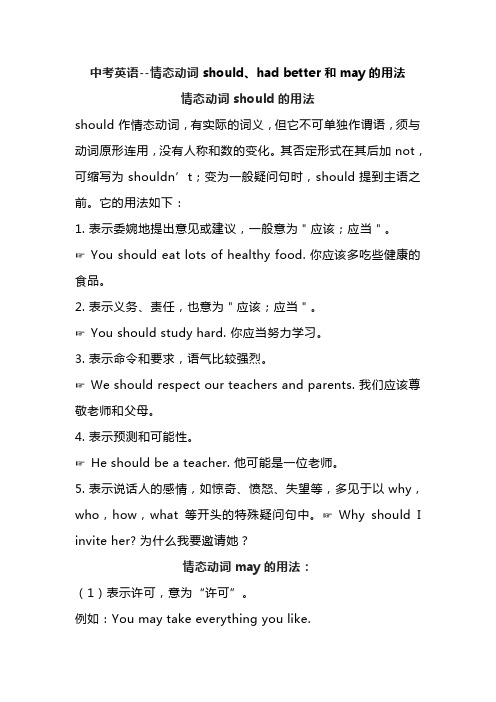
中考英语--情态动词should、had better和may的用法情态动词should的用法should 作情态动词,有实际的词义,但它不可单独作谓语,须与动词原形连用,没有人称和数的变化。
其否定形式在其后加not,可缩写为shouldn’t;变为一般疑问句时,should 提到主语之前。
它的用法如下:1. 表示委婉地提出意见或建议,一般意为"应该;应当"。
☞ You should eat lots of healthy food. 你应该多吃些健康的食品。
2. 表示义务、责任,也意为"应该;应当"。
☞ You should study hard. 你应当努力学习。
3. 表示命令和要求,语气比较强烈。
☞ We should respect our teachers and parents. 我们应该尊敬老师和父母。
4. 表示预测和可能性。
☞ He should be a teacher. 他可能是一位老师。
5. 表示说话人的感情,如惊奇、愤怒、失望等,多见于以why,who,how,what等开头的特殊疑问句中。
☞ Why should I invite her? 为什么我要邀请她?情态动词may的用法:(1)表示许可,意为“许可”。
例如:You may take everything you like.(2)表示推测,通常用于肯定句和否定句中,意为“可能”。
例如:He may be very busy now.注意:can和may都不是可能性,can通常用于否定句和疑问句中,而may通常用于肯定句和否定句中。
虽然两者均可用于否定句中,但其意思不同:can't意为“不可能”,may not意为“可能不”。
另外,can和may均可表示请求允许,但can为一般用词,而may为正式用词。
had better的用法其意为“最好”、“应该”,后接动词原形,与情态动词should 用法相似,其中的had通常缩略为 'd。
情态动词should
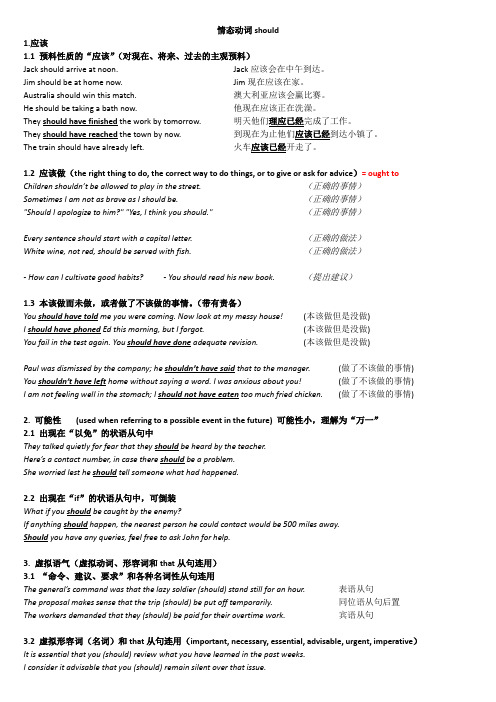
情态动词should1.应该1.1 预料性质的“应该”(对现在、将来、过去的主观预料)Jack should arrive at noon. Jack应该会在中午到达。
Jim should be at home now. Jim现在应该在家。
Australia should win this match.澳大利亚应该会赢比赛。
He should be taking a bath now.他现在应该正在洗澡。
They should have finished the work by tomorrow. 明天他们理应已经完成了工作。
They should have reached the town by now.到现在为止他们应该已经到达小镇了。
The train should have already left.火车应该已经开走了。
1.2 应该做(the right thing to do, the correct way to do things, or to give or ask for advice)= ought to Children shouldn’t be allowed to play in the street.(正确的事情)Sometimes I am not as brave as I should be.(正确的事情)"Should I apologize to him?" "Yes, I think you should."(正确的事情)Every sentence should start with a capital letter.(正确的做法)White wine, not red, should be served with fish.(正确的做法)- How can I cultivate good habits? - You should read his new book.(提出建议)1.3 本该做而未做,或者做了不该做的事情。
情态动词should的用法讲解

should(1)表“劝告、建议”时,可译成“应该”,这时可用ought to替换。
You should keep your promise.你应该遵守诺言。
Young people should learn how to use computers. 年轻人应该学如何应用计算机。
(2)表示委婉陈述自己的意见。
I should think you are right.我想你是对的。
I should advise you not to go now.我劝你现在别走。
(3)表示惊异赞叹、忧虑、惋惜、欢欣、不满等情绪。
Why should you think so?你为何这样想呢?(不满)It's strange that it should be so hot today.很奇怪,今天怎么这么热。
(惊奇)It's wonderful that you should have achieved so much in these years.这几年你们有了这样大的成绩,真了不起。
(赞叹)(4)表推测意为“可能,该”,表示对现在情况、将来情况的推测。
They should be home by now.他们现在应当到家了。
The book you need should be in our library.你需要的那本书我们图书馆应该有。
It’s nearly seven o’clock. Jack should be here at any moment.现在快要七点了,杰克随时会到。
-When can I come for the photos? I need them tomorrow afternoon. 我什么时候能取照片?明天下午要用。
- They should be ready by 12:00.明天12点前应该能冲好。
(5)“should+完成时”,在肯定句中,表示应完成而实际未完成的事情;如果用在否定句中,则表示发生了不应当发生的事件。
should用法总结

疑问句中使用方法
一般疑问句
在一般疑问句中,should通常放在句首 ,用于询问对方的建议或看法。例如: “Should we go out for dinner tonight?”(我们今晚应该出去吃饭吗? )
VS
特殊疑问句
在特殊疑问句中,should可以与其他疑 问词一起使用,用于询问更具体的信息。 例如:“Why should we hire him for the job?”(为什么我们应该雇他来做这 份工作?)
表达责任或义务时运用
强调责任
should可以用来强调某人的责任或义务,例如“You should apologize for what you did.”(你应该为你 所做的事情道歉。)
表示必要性
在表达某种必要性时,should可以表示一种强制性的 要求或命令,例如“You should wear a helmet when you ride a bike.”(骑自行车时你应该戴头盔 。)
should用法总结
汇报人:XX
目录
• should基本概念与用法 • should在时态和语气中运用 • should与其他情态动词比较 • 常见错误及注意事项 • 实例分析:should在不同场合下运用 • 总结回顾与拓展延伸
01
should基本概念与用法
should定义及词性
定义
should是英语中的一个情态动词,用 于表达建议、义务、可能性等含义。
“You should study hard.”(你应该努力学习。)表示 一种责任,而“You can study hard.”(你可以努力学习 。)表示一种能力或可能性。
要点二
should的语气比can/could更为 强烈。例如
八年级上册英语情态动词should知识点:期末考试复习
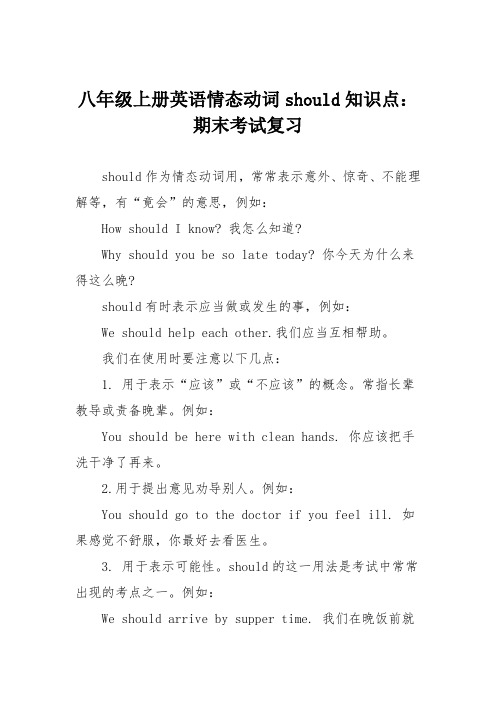
八年级上册英语情态动词should知识点:
期末考试复习
should作为情态动词用,常常表示意外、惊奇、不能理解等,有“竟会”的意思,例如:
How should I know? 我怎么知道?
Why should you be so late today? 你今天为什么来得这么晚?
should有时表示应当做或发生的事,例如:
We should help each other.我们应当互相帮助。
我们在使用时要注意以下几点:
1. 用于表示“应该”或“不应该”的概念。
常指长辈教导或责备晚辈。
例如:
You should be here with clean hands. 你应该把手洗干净了再来。
2.用于提出意见劝导别人。
例如:
You should go to the doctor if you feel ill. 如果感觉不舒服,你最好去看医生。
3. 用于表示可能性。
should的这一用法是考试中常常出现的考点之一。
例如:
We should arrive by supper time. 我们在晚饭前就
能到了。
She should be here any moment. 她随时都可能来。
以上就是为大家整理的八年级上册英语情态动词should知识点:期末考试复习,大家还满意吗?希望对大家有所帮助!
相关标签搜索:八年级英语期末试卷。
- 1、下载文档前请自行甄别文档内容的完整性,平台不提供额外的编辑、内容补充、找答案等附加服务。
- 2、"仅部分预览"的文档,不可在线预览部分如存在完整性等问题,可反馈申请退款(可完整预览的文档不适用该条件!)。
- 3、如文档侵犯您的权益,请联系客服反馈,我们会尽快为您处理(人工客服工作时间:9:00-18:30)。
【情态动词】should 的八大用法
一、Should 表示过去将来时,即从过去观点看将来要发生的是,多用于间接引语中。
We thought that we should never see you again. 我们想我们再也看不到你了。
The BBC weather report this morning said that we should have rain.今天早上,BBC电台天气报告说,今天有雨。
二、Should 表示义务、责任、常译为“应当”,“应该”,或表示一种估计的情况,译成“按理应当”,“估计......”。
Why should I pay him 为什么我该付给他钱
They should be there by now,I think. 我估计,他们现在到那儿了。
Should 用于完成时态,表示对过去发生的动作的一种推测,译成“应该已经......”。
You should have washed the wood. (But you haven't.) 你应该把伤口清洗了。
(然而你没有)
三、Should 用于虚拟语气中。
)
(1)用于It is necessary (important,strange...that...)中,在美国英语中should 常省去。
It is important that we (should) learn English well. 我们学好英语很重要。
(2)用于It is ordered (suggested)that...中,而在美语中should常省去。
It is decided that we (should) finish our work in a week.决定我们要在一周之内完成我们的工作。
(3)用于表示命令、请求、建议、决定等词后面的宾语从句中,在美国英语中should常省去。
He wrote,suggesting that Mr. Wang (should) come to Beijing. 他信中建议王先生到北京来。
The commander ordered that the city (should) be taken in five days.司令员下令必须在五天之
内占领这座城市。
(4)should用于表示命令、请求、建议、决定等词后面的表语从句,同位语从句中,在美国英语中should 常省去。
We all agreed to his suggestion that we (should) go to Beijing for sightseeing.我们都同意他的意见,去北京观光。
My idea is that we (should) do exercises first. 我的意见是我们先做练习题。
:
(5)用于if引导的从句中,表示与将来事实可能相反的假设。
If it should rain tomorrow,we would stay home. 如果明天下雨,我们就呆在家里。
四、在条件状语从句中,should 表示“万一”,即可表示不能实现的假设,又可表示可以实现的假设。
If he should fail to come,ask Comrade Cheng to work in his place.万一他不来,就叫陈同志代替他的工作。
Should it rain tomorrow,the meeting would be put off. 万一明天下雨,会议就延期。
五、在某些从句中,should 表示惊异、意外等情绪,常译为“竟然”。
It seems unfair that this should happen to me.真不公平,这件事竟然发生在我身上。
六、should 用于主句中,主语是第一人称,表示某一条件下所产生的必然结果,并与事实相反;当主语是第二、三人称时,表示说话人或执笔人的意志或看法。
If I met her,I should tell her about it. 如果我碰到他,我肯定会将此事告诉他。
If he had much money,he should buy it. 如果他有很多钱的话,我就让他买了。
`
七、当陈述部分含有ought to ,其反意疑问句部分,美国英语中用should . She ought to stay here,shouldn't her她该留在这儿,是吗
八、用于成语中I should like to......“我想(做)......”
I should like to ask the teacher a question. = I should love to ask the teacher a question. 我想问老师一个问题。
\
【情态动词】should 的用法
1、should 作为情态动词,通常用来表示现在或将来的责任或义务,译作“应该”、“应当”,这时它可以和ought to, be supposed to 互换使用.例如:
You should (= ought to )tell your mother about it at once.
2、should 作为情态动词,可以用在条件状语从句中,表示语气较强的假设,译作“万一”、“竟然”,这时也可将should 置于从句之首,即将should 放在主语前面,而省略从属连词if .例如:
!
If you should fail to come, ask Mr Chen to work in your place. (= Should you fail to come, ask Mr Chen to work in your place. )
3、should 作为情态动词,可以表示谦逊、客气、委婉之意,译为“可……”、“倒……”.例如:
I should say that it would be better to try it again.
4、should 作为情态动词,可以用来表示意外、惊喜或者在说话人看来是不可思议的.尤其在以why, who, how 等开头的修辞疑问句或某些感叹句中常常译为“竟会”、“居然”.例如:
How should I know it 我怎么会知道这件事
5、should 作为情态动词,可以用来表示有较大可能实现的猜测、推论,通常译为“可能”、“总该……吧”,相当于be expected to .例如:
They should be home by now, I think. 我想现在他们总该到家了吧.
6、should 作为情态动词,用在由so that, for fear that, lest 引导的目的状语从句和in case (that)引导的条件状语从句中,有“能够”、“可能”、“会”之意.例如:They got up early so that they should (= could/ might)catch the first bus in time.
7、should 作为情态动词,可以用于下列虚拟语气句中:
(1)用在表示与将来事实相反的条件状语从句中,构成“ If …… should (do sth)……, …… would/ co uld/ might (do sth.)…… ”句式
(2) 用在suggest (propose), arrange, plan, decide, advise, order, demand, request, desire, insist 等表示“建议”、“要求”、“命令”、“决定”、“安排”、“计划”、“主张”的动词后面接的宾语从句中.这里的should 也可以省略.。
